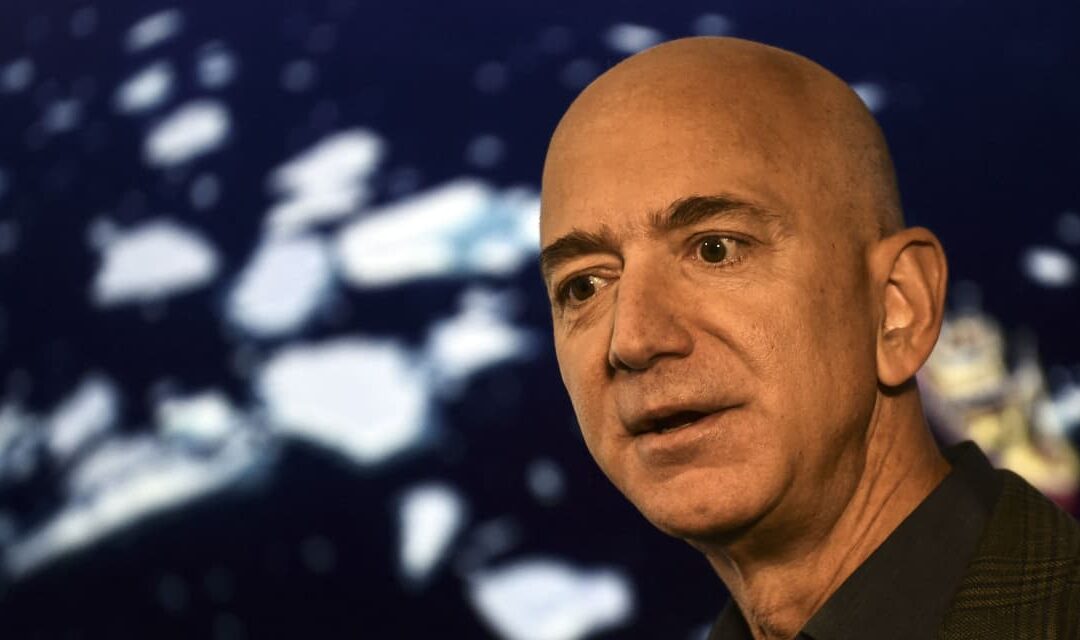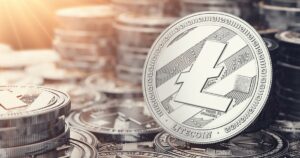A former version of this story incorrectly referred to Jeff Bezos as CEO of Amazon. The story has been corrected.
In this file photo taken on September 19, 2019 Amazon founder and former CEO Jeff Bezos speaks to the media on the company’s sustainability efforts in Washington,DC. Bezos said he would like to see the human population grow to one trillion.
Agence France-Presse/Getty Image
Jeff Bezos has said AI is more likely to save humanity than make it go extinct, while claiming he would like to see the human population grow to one trillion and live in huge cylindrical space stations away from Earth.
In an interview with podcaster Lex Fridman, the Amazon
AMZN,
founder and former CEO rejected the idea humans should colonize other planets, and instead said he believes building out gigantic O’Neill space colonies is the only way to achieve such population growth.
“I would love to see a trillion humans living in the solar system. If we had a trillion humans, we would have, at any given time, 1,000 Mozarts and 1,000 Einsteins,” he said. “The only way to get to that vision is with giant space stations. The planetary surfaces are just way too small.”
Bezos, who is currently worth $172 billion, said building out a series of O’Neill space colonies near Earth, using materials from the Moon and various other objects in the asteroid belt, would be advantageous in letting people visit our current planet on vacation.
The concept of O’Neill colonies was invented by science fiction writer Gerard K. O’Neill as a solution to creating livable environments in space. The space stations, which consist of two cylinders that rotate around an axis, offer an artificial Earth-like environment on the inside while using rotation to create artificial gravity.
Bezos’ vision sits in opposition to that put forward by Tesla
TSLA,
CEO Elon Musk, who is currently the richest person in the world. Musk. Via his company SpaceX, Musk has said he’s currently aiming to colonize Mars and hopes humans will become a “multiplanetary species”.
In Bezos’ vision, cylindrical O’Neill space colonies would help support a population that is 125 times the size of the Earth’s current population.
He said people would be free to choose whether they live in space, but that those who opted for the O’Neill colonies would “’be able to use much more energy and much more material resource in space than they would be able to use on Earth.”
Bezos also said those living in space would still have the opportunity to travel to Earth on vacation in the “same way that you might go to Yellowstone National Park”.
The U.S. billionaire, however, acknowledged that he “won’t live long enough to see the fruits” of his own efforts to colonize space, as he argued the rewards of his work with space company Blue Origin “come from building a road to space.”
In the interview, Bezos also put forward an optimistic vision of the future of artificial intelligence, despite warning it has potential to be “incredibly destructive.”
He argued AI has the potential to save humans from going extinct, as he argued that people who are “overly concerned” about the dangers of the technology “may be missing part of the equation.”
“Even in the face of all this uncertainty, my own view is that these powerful tools are much more likely to help us and save us even than they are to on balance hurt us and destroy us,” Bezos said.
He explained that AI has the potential to help humanity develop “better medicines and better tools to develop more technologies” which could ensure its long-term survival.
Musk, in contrast, has repeatedly raised concerns about the dangers of AI and said it poses a “risk” to humanity.
Bezos added that humans need to start thinking more long term, as he warned about the dangers of nuclear weapons and climate change. “We need to start training ourselves to think longer term,” he said.
He also talked about his own childhood, saying that working on his grandfather’s ranch in Texas as a child instilled within him a “problem-solving mentality.”
He explained that he spent his summers on the ranch between the ages of four and 16, to give his mother, who had Bezos aged 17, a break. During this time, he worked a variety of jobs while taking daily breaks with his grandfather to watch the soap opera, Days of Our Lives.
The entrepreneur also said his encounters at Princeton University with a fellow student from Sri Lanka convinced him not to be a theoretical physicist, in making him realize “ your brain has to be wired in a certain way.”
He explained that the student, called Yosanta, was able to solve a “difficult partial differential equations problem” in seconds, which Bezos and a fellow student had previously been working on for three hours without making any headway whatsoever.








